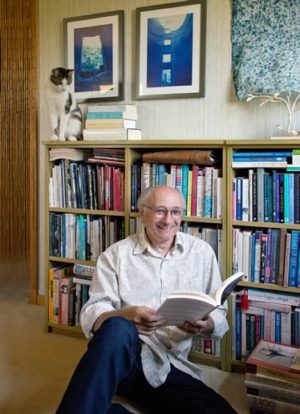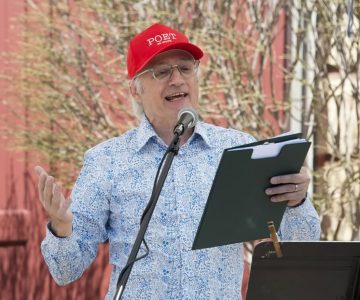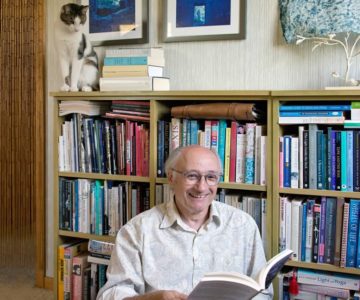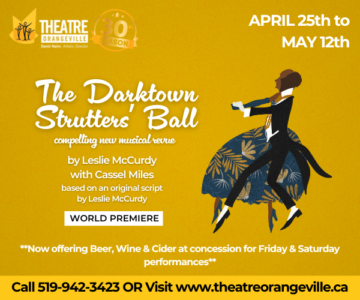Meet Harry Posner
Dufferin County’s first poet laureate waxes eloquent on reclaiming the power of words and uniting our local arts community.
Someday we’ll be able to measure the power of words. I think they are things. They get on the walls. They get in your wallpaper. They get in your rugs, in your upholstery, and your clothes, and finally into you.
—Maya Angelou
Harry Posner calls Maya Angelou “the goddess of poetry.” Anyone who knows her work can understand why. Still, the quote above puts a finer point on his reasoning. As warm and accessible as Harry is (and he is), Dufferin County’s inaugural poet laureate, appointed June 1 this year, always chooses his words carefully. And for good reason. A big part of Harry’s new role is to reclaim the power of words, to reinvigorate language, to heighten local awareness and passion for the spoken and written word. No mean feat in an age of infinite unvetted digital content and fake news. Harry, though, is up to the job.

Dufferin poet laureate Harry Posner at home with his books and his cat Tweed: “It’s not my job merely to reflect local culture, but to stir it up a bit.” Photo by Pete Paterson.
Author of four books and two audio poetry CDs, Harry is a freelance editor, proofreader and podcaster. With literary activist Anthony Carnovale, he co-founded Cyclotron, a local arts organization that builds community connections through storytelling and creative writing workshops, and a new arts-centric e-zine, Extra Pulp. From workshops for kids on the autism spectrum to organizing writing festivals, Harry has worked tirelessly to ensure the literary arts thrive locally and beyond.
In his new role, Harry follows in the footsteps of poets laureate dating back to the late Middle Ages in Europe, who were charged with composing poems for national events and celebrations. Like those first named in 14th-century Italy, Harry’s appointment is an honour acknowledging his considerable contributions to local culture. The role also reflects how highly Dufferin values arts in all aspects of local life. The county is part of a recent and emerging trend of communities large and small across this country embracing anew this age-old appointment of honour. Still, Dufferin is impressively the only rural municipality represented in Canada’s growing league of poets laureate.
So what role do poetry and the medieval notion of a poet laureate play in 21st century rural Ontario? I sat down recently with Harry to ask him just that, and more.
Why does poetry still matter today?
In this Internet age, it’s increasingly the case that language means less and less. Its weight has diminished. We’ve lost our ability to find truth in language. For example, Donald Trump. He uses the words “great, huge, tremendous” to the point where they mean absolutely nothing, because we don’t believe him. They are repeated over and over (he’s not a very creative soul). In contrast, poetry honours every word. In this way, part of the responsibility of a poet is to rejuvenate language, to restore its meaning in a fresh way.
Why did you want to be a poet?
I am a poet laureate, but I don’t define myself as a poet. I’ve played the field in language arts for many years – novel writing, short story writing, children’s writing, script writing, song writing. You name it. Poetry is just one element of what I do.
So what drew you to the language arts?
I didn’t grow up in a household that was bookish. My parents came from Poland after the war. Their English was passable. They weren’t book readers. They weren’t intellectuals. They would, however, acquire one volume of an encyclopedia from the grocery store per month. That was the bulk of my reading material for many years. Then, being forced to memorize poetry in school made me appreciate language and the use of words. T.S. Eliot, E.E. Cummings – poets like these really impressed me – the way they could take apart language and put it back together. And Gertrude Stein did crazy things with language. I patterned myself in my early days after great writers like these.
With this broad experience in literary arts, what does the role of poet laureate mean to you?
Poets laureate must have a love for poetry, but more broadly, a love for the written word. A poet laureate should be eager to share that love, to encourage others to come forward to share their work, mentor other writers, and appear at events and official functions. They should bring poetry and other literary arts into the spotlight at community events.
I believe poetry can bring alternative interpretations to such events. For example, I wrote a poem called “My O Canada” for the Canada 150 celebrations in Mulmur. It’s a reinterpretation of our national anthem, bringing the balance of a First Nations’ perspective into the celebration.
So it’s not my job to reflect merely local culture, but to stir it up a bit. To probe, to challenge and to jostle local culture back to life, if you like.
How are you going to jostle Dufferin County culture?
I’m going into the schools through the Dufferin Arts Council teaching poetry and poetry appreciation to young people.
I also want to bring more poetry to the streets. April is poetry month. Next April I hope to organize a day of art and spoken-word poetry in Orangeville.
Do you think spoken word performance will help people better connect to poetry?
I hope so. Promoting poetry by performing it at public events reaches a lot of people who don’t normally turn to poetry for inspiration. I’ve had lots of people come up to me after such performances and say, “I’ve never really thought of poetry very much, but what you did there was really cool. Because you were passionate, you were involved in it.”
I also want to create a cultural time capsule. All the arts will be represented, and it will be buried at the geographic heart of Dufferin County for people 50 years hence to open up and understand our cultural landscape – to reveal who we were as people, as artists. I’m collaborating, too, on a podcast with technowizard Peter Noce of connectingdotsmedia.com about where art and technology intersect. These are just some of the ideas on the table.
What about giving profile to different art forms?
My first project, Lines That Bind, involves collaboration between writers and visual artists. I’ll bring a painting to a poet and say, “Find inspiration in this and create a poem,” then give it to another painter who will create a piece to inspire a different poet, and so on. In the end, we’ll have a show at Dufferin County Museum & Archives highlighting this dialogue between artistic communities and revealing more clearly their inspirations.
Speaking of understanding that inspiration – many people feel you have to have studied poetry to know how to read it. Do you think there is something in poetry for everyone?
Some people seem as far away from poetry as you can imagine. But yes, there is something for everyone. Poetry is unique in the world of culture. It steps out of our day-to-day narrative to point at deeper meaning. Yes, often in a way that is difficult to access. A poem can be three lines and give you this fullness of understanding of a particular detail of life you’d never considered before. The focus is close up. It can be very simple and very nuanced, often at the same time. Which makes it a little more challenging to access.
What do you say to people who feel intimidated when they don’t grasp all of a poem, when parts go over their heads?
Don’t worry about it. It’s not important. What’s important is what you do get out of it. You might have to come back to the poem a few more times, even over years. And heaven forbid, you might have to look something up.
Get what you get, look up what you want to look up or say, “I just don’t like this poem,” and put it aside.
Everyone should understand – this type of writing has been around forever. It was our way of disseminating news through the bards and storytellers. Spoken word storytelling, poetry, has been a part of community life for thousands of years.
Do you think music helps people understand how to approach poetry?
Yes. Look at rap, hip-hop, poetry slams. Many lyrics and other forms of poetry today are quite conversational and direct. They address common issues like racism, sexism. Choose a form that touches you and engage with it.
His words: Harry Posner’s update on O Canada.
I think, too, music makes us feel words first rather than just think about them. I thought for years Neil Diamond was singing, “I am a chair” (not “I am, I said”). It didn’t matter because it had grabbed me. A lot of poetry focuses more on sound than meaning. Like music, the sound of the words can reach our bodies first in a rhythmic way.
What other poets laureate inspire you?
Although Maya Angelou was never officially a poet laureate, she was often celebrated informally as such. She was a goddess of poetry. But my first connection to poets laureate locally was in Owen Sound. I got wind of a regular open mic event there some years ago, and met a number of poets and spoken worders, including poets laureate Kristen Anderson and Liz Zetlin.
Liz is a marvellous poet whose writings (and life) really connect with the natural world. She created a punctuation garden on her property – way cool (plants configured in commas, semicolons and the like). And she’s also a filmmaker and water advocate. Her work inspired me then and still does. In the years since, I’ve gotten to know Owen Sound’s other worthy poets laureate as well.
What advice can you offer young poets?
First, everything can be a subject for poetry. The world, your life is the subject matter. Total freedom. How good is that!
Second, do not play by the rules. Know the rules, but do not play by them. Be playful with the building blocks of language, build them then tear them down, rebuild them and tear them down again. In other words, be a child.
Third, don’t care what people think. Don’t take criticism too harshly. We are all works in progress. Some things work, some don’t. Carry on and remain true to self.
You’ve supported literary arts at a grassroots level for decades, here and in other regions. What do you hope will be your literary legacy in Dufferin County?
I like the idea of bringing creative people together. Many writers don’t know their fellow local writers. It makes a difference being part of a community, having open mic nights, getting writers out of the woodwork to network and collaborate. It’s a way of supporting each other in a world that doesn’t always support the written arts.
I also worry that writing and reading are becoming less and less a pastime. My job is to help get love of language moving again in our community. Enliven it, so we don’t fall asleep to its power, to its meaning, to its magnificence.
***
With final sips emptying our cups, we bemoan together the loss of attention span for language in this twittering age. Harry insists again – poetry, like all art forms, is a beacon. It encourages you to feel more, to understand more, to transform. He insists this is the responsibility of artists.
“So poetry,” I summarize, “is a metaphor for what we need more of in today’s world – a reason to pause and consider things more deeply?”
“I couldn’t have said it better myself,” Harry smiles.
I doubt that.
Did You Know?
The history of poets laureate
The Italians first introduced the notion of a poet laureate in the early 14th century – an attempt to revive the values of the classical age of ancient Greece when poets were revered alongside great warriors – each considered anchors to civilization. “Laureate” derives from the laurel head wreath bestowed upon such honourees.
Great Britain later fully embraced the concept and began a tradition of great poets laureate including such literary giants as John Dryden, William Wordsworth, Alfred Tennyson and John Betjeman, to name a few.
The United States was the first country in the New World to recognize the importance of the role, with poet laureates associated with the Library of Congress in place since 1937. Among these, Robert Frost brought the position to a broad national stage when he tried to read his poem “Dedication,” newly composed for the inauguration of President John F. Kennedy. When blinding sun prevented him from reading the new text at the event, he quickly pivoted, reciting from memory “The Gift Outright,” composed in the 1930s. For the millions watching on TV and listening to their radios, the poem was deeply moving and the first mass-media experience of the power of poetry. Maya Angelou, often dubbed America’s Poet Laureate, made a similar mark at the inauguration of President Bill Clinton, reciting her poem “On the Pulse of Morning.”
Among the 20 or so countries now with national poets laureate, Canada was somewhat late to the game, designating our first Parliamentary Poet Laureate, George Bowering, in 2002. George Elliott Clarke is the nation’s current laureate. About two dozen Canadian towns, cities and provinces have appointed poets laureate since the 1990s. Still, Dufferin County remains the only rural municipality to appoint such a champion of poetry and other literary arts.
Related Stories

Day of the Poets
Mar 19, 2019 | | ArtsOrangeville’s festival promises to “saturate the air with poetry.”









